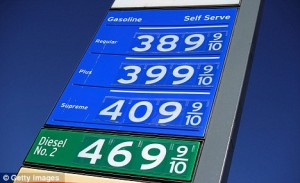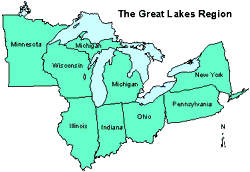
Michigan’s Governor looks to a gas tax to increase funding for roads and bridges. Photo: marsmet501 (flickr)
As vehicles are becoming more efficient and gas tax rates have remained the same for decades, those taxes no longer provide enough money to pay for the building and upkeep of roads and bridges, the Snyder administration says.
New technology that tracks how much a vehicle drives may provide an answer — but only way down the road.
Michigan now taxes motorists 19 cents per gallon for gasoline and 15 cents for diesel, last raised in 1997. And the federal tax of 18.4 cents a gallon hasn’t been raised in nearly two decades.
According to the Department of Transportation (MDOT), Michigan’s rate is one of the lowest in the Great Lakes area and the state’s gas tax revenue declined more than $100 million from 2001 to 2011.
“The tax needs to be raised,” said Lance Binoniemi, vice president of the Michigan Infrastructure and Transportation Association.
“The cars have been more fuel efficient, and since gas prices have been rising, people are purchasing less gas than before,” he said.
According to the Obama administration’s new fuel-economy standards for cars and light trucks, the average is expected to be around 35.4 miles per gallon by 2025. And 2012 model vehicles average 23.4 miles per gallon, according to the University of Michigan Transportation Research Institute.
One alternative would be toll roads, but Kirk Steudle, director of MDOT said that would be unworkable.
Some states have come up with a high tech solution called the vehicle miles traveled (VMT) tax. It taxes drivers by how many miles they travel rather than by how much gasoline they buy. It is implemented by using GPS units on-board a vehicle to record distance, assign it to the appropriate taxing jurisdiction and calculate the amount owed.
“This is an electronic-based method that makes every road a toll road,” Steudle said.
Minnesota and Oregon already are testing technology to keep track of mileage. Other states, including Washington and

According to the Michigan Department of Transportation, the state pays one of the lowest gas tax rates in the region. Photo: U.S. EPA
Nevada, are preparing similar projects.
According to Steudle, one of the biggest challenges is expense because it would require instruments in every vehicle rather than at gas stations only.
Privacy concerns pose another great obstacle for the VMT tax.
“Some people don’t like the GPS tracking them going everywhere, but like you young people checking in on Foursquare all the time, you already share with other people,”
Steudle said.
Binoniemi said the state doesn’t have enough education and knowledge about the VMT tax yet.
“Michigan is premature in moving in that direction,” he said.
Binoniemi predicted that the federal government would take action on the VMT tax before most individual states.
“They are seeing the same problem in gas tax as we are. There have been several studies looking into how we can address this concern by a VMT tax. I don’t think Michigan will begin this before the federal level,” he said.
And Steudle said, “We are always the first, but in this issue, we can be the second.”
From an article on the Oregon VMT:
“Oregon wants to offer motorists a range of options for how VMT is collected so that nobody can accuse the system of being an invasion of privacy, Whitty says. Pilot participants can choose to use a simple device that counts mileage but doesn’t involve GPS. They can use a GPS if they want to avoid being charged for driving on private or out-of-state roads. They can use a smart-phone app that uses GPS — but only when the app is turned on. Or they can opt out of any measurements at all and just pay a flat fee.
In addition to having various types of technology on the car, the pilot also gives motorists the option of having the fees processed by the government directly or via a private company. Whitty says the latest pilot should be the last step policymakers need before actually being able to start creating legislation that would implement VMT fees.”
I believe that there was a pilot that also had an “enter your own mileage at the gas pump” option, where the mileage entered was double checked at inspections and oil changes, to prevent cheating.
The Michigan Highway Department–aka Department of Transportation (sic)–is the most untrustworthy department in state government. They have been known to out-and-out lie to state and federal regulators in order to get their way (as they did with the M-5 extension project). Decades of mis-management and empire building have brought Michigan roads to the state they are in today. Simply giving them more money will only exacerbate the problems Michigan faces with transportation needs.
Michigan already has one of the highest taxes on motor fuel in the entire country. In addition to the state excise tax on gasoline and diesel fuel, Michigan levies a sales tax on it as well. The plan to raise the gas tax by 19 cents per gallon would make Michigan the absolute HIGHEST tax in the entire country.
Governor Snyder and his fellow Republicans need to stop scheming ways to tax Michigan citizens into oblivion–while giving corporate tax breaks to their favored few. If they’re so intent on throwing more money at highways (I guess they have to pay for the infrastructure leading to the the new international bridge somehow) then they should simply earmark some of the sales tax on gas. That will still continue to destructive trends of MDOT, but at least it would spare people from the onslaught of higher taxes being proposed by our illustrious politicians.
If fuel prices weren’t so high, the economy would recover, people would drive more and tax revenue would increase. Take a look at the economies in California and Illinois. You can’t tax your way to prosperity.